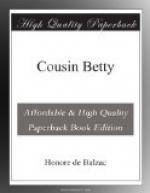“I know, madame,” replied the doctor, “all the scenes of which charity compels you to be a spectator; but you will get used to it in time, as we all do. It is the law of existence. The confessor, the magistrate, the lawyer would find life unendurable if the spirit of the State did not assert itself above the feelings of the individual. Could we live at all but for that? Is not the soldier in time of war brought face to face with spectacles even more dreadful than those we see? And every soldier that has been under fire is kind-hearted. We medical men have the pleasure now and again of a successful cure, as you have that of saving a family from the horrors of hunger, depravity, or misery, and of restoring it to social respectability. But what comfort can the magistrate find, the police agent, or the attorney, who spend their lives in investigating the basest schemes of self-interest, the social monster whose only regret is when it fails, but on whom repentance never dawns?
“One-half of society spends its life in watching the other half. A very old friend of mine is an attorney, now retired, who told me that for fifteen years past notaries and lawyers have distrusted their clients quite as much as their adversaries. Your son is a pleader; has he never found himself compromised by the client for whom he held a brief?”
“Very often,” said Victorin, with a smile.
“And what is the cause of this deep-seated evil?” asked the Baroness.
“The decay of religion,” said Bianchon, “and the pre-eminence of finance, which is simply solidified selfishness. Money used not to be everything; there were some kinds of superiority that ranked above it —nobility, genius, service done to the State. But nowadays the law takes wealth as the universal standard, and regards it as the measure of public capacity. Certain magistrates are ineligible to the Chamber; Jean-Jacques Rousseau would be ineligible! The perpetual subdivision of estate compels every man to take care of himself from the age of twenty.
“Well, then, between the necessity for making a fortune and the depravity of speculation there is no check or hindrance; for the religious sense is wholly lacking in France, in spite of the laudable endeavors of those who are working for a Catholic revival. And this is the opinion of every man who, like me, studies society at the core.”
“And you have few pleasures?” said Hortense.
“The true physician, madame, is in love with his science,” replied the doctor. “He is sustained by that passion as much as by the sense of his usefulness to society.
“At this very time you see in me a sort of scientific rapture, and many superficial judges would regard me as a man devoid of feeling. I have to announce a discovery to-morrow to the College of Medicine, for I am studying a disease that had disappeared—a mortal disease for which no cure is known in temperate climates, though it is curable in the West Indies—a malady known here in the Middle Ages. A noble fight is that of the physician against such a disease. For the last ten days I have thought of nothing but these cases—for there are two, a husband and wife.—Are they not connections of yours? For you, madame, are surely Monsieur Crevel’s daughter?” said he, addressing Celestine.




